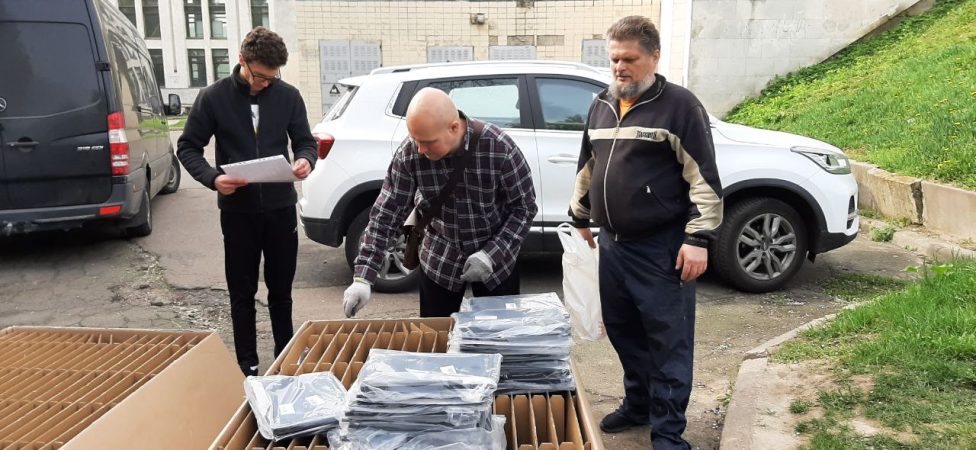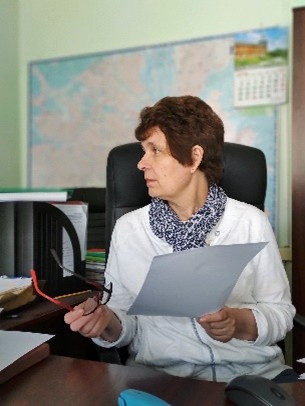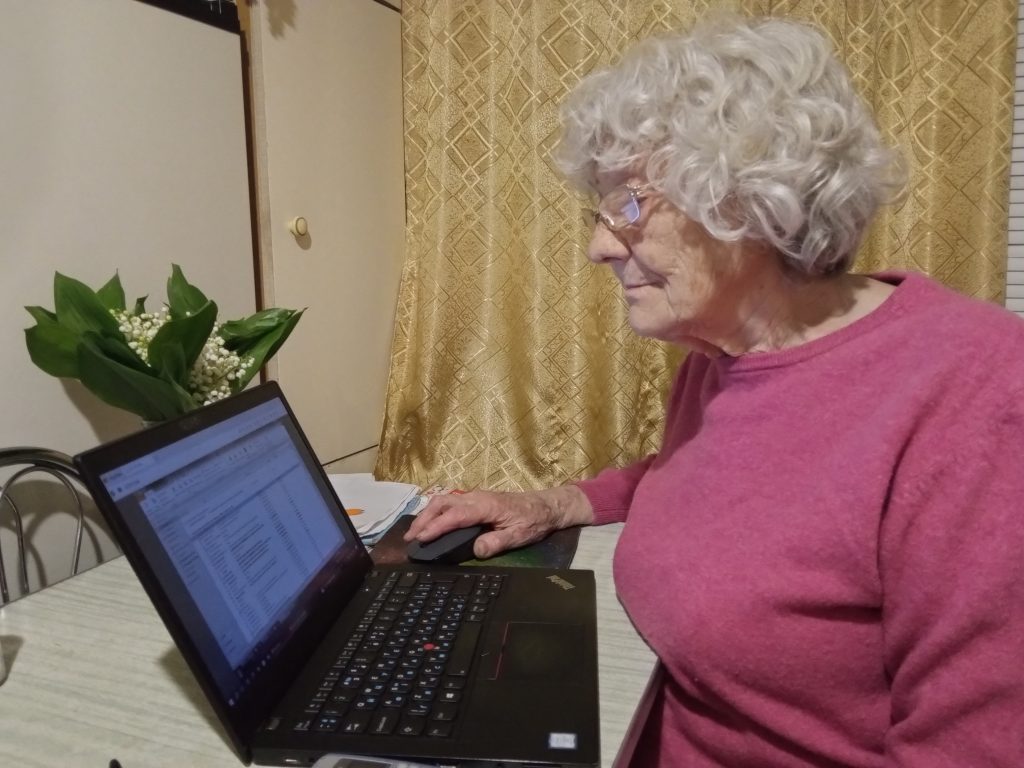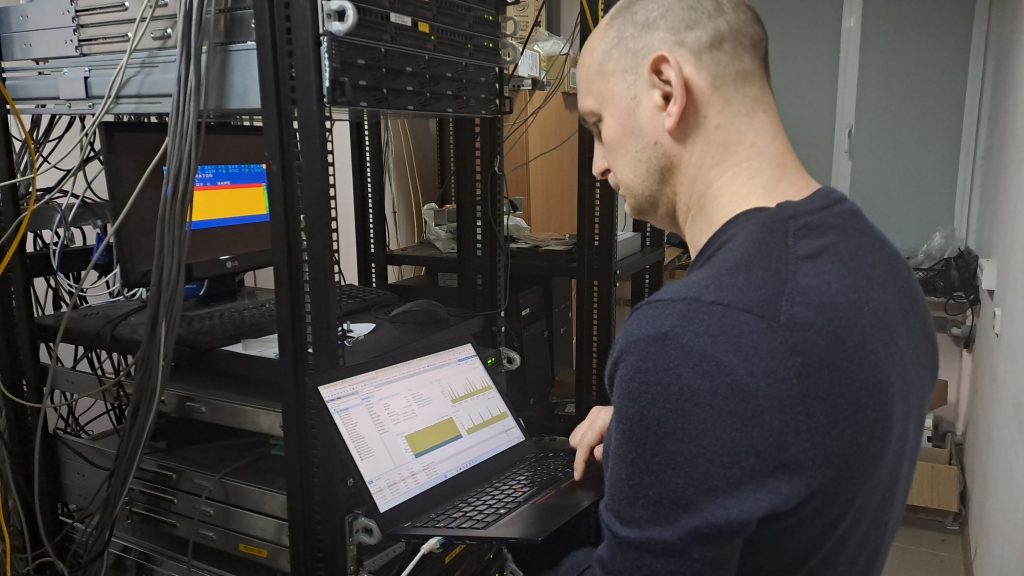Impact of Computer Aid humanitarian equipment on Ukrainian researchers and educators
Published: 12 November 2024
Text – Tetiana Preobrazhenska, URAN

In December 2023, the URAN Foundation (a charitable organisation of the URAN Association, the Ukrainian NREN) received 65 laptops for Ukrainian researchers and educators from the UK. This humanitarian aid was organised for Ukraine by the GÉANT community through the Computer Aid charity: Computer Aid prepared and delivered the laptops, GÉANT paid for them with funds donated to the Vietsch Foundation by European NRENs, and URAN distributed them to universities and research institutions.
Preparation and delivery
“First thing, the URAN Association’s technical specialists checked each laptop and replaced all the power cables and UK plugs. ” Larysa Shevchenko, director of the URAN Foundation, says.
The laptops had a pre-installed Windows licence that needed to be properly activated, so the URAN specialists prepared and posted relevant instructions on the website.
The next step was the distribution of laptops among selected R&E institutions.
“We based our distribution on a survey shared with users about their IT equipment requirements carried out in the summer of 2023” Larysa Shevchenko explains. “First of all we looked at institutions in cities that had been intensely shelled. This was the main criterion. We also gave priorities to universities evacuated from the occupied territories. In total, we selected sixteen institutions.”

The entire URAN team was involved in the equipment preparation:
– the finance team advised the beneficiary institutions on the correct preparation of documents for humanitarian aid;
– the technical specialists checked the laptops and equipped them with new power cords;
– the rest of the team added the necessary supporting documents to the kit and packed them.
“We arranged the shipments in between shelling or air raids: each team member, whenever available, delivered the parcels to the post office and processed the shipments. In February 2024, we shipped the last batch of laptops, the whole process took almost two months. At the start it was somewhat chaotic due to our lack of experience in dealing with charity donations: initially we did struggle to choose the correct documents for the transfer of humanitarian aid to institutions and did not find an effective way to distribute work within the team straight away. Now we know how to organise the process effectively, and hopefully future batches will reach our users more rapidly” Larysa Shevchenko adds.
How scientists are using the humanitarian IT equipment
One of the first institutions to receive the laptops was the O. Ya. Usikov Institute for Radio Physics and Electronics of the National Academy of Sciences of Ukraine. This scientific centre conducts radio physical research on solids and biological objects, studies radio wave propagation, and is engaged in remote sensing of the Earth’s environment from aerospace carriers.
The Institute is located in Kharkiv, which suffers from daily shelling and power cuts.
“To organise work in such conditions, reliable IT equipment is needed,” says Nadiia Savenko, deputy head of the telecommunications and grid technologies department. “People have to work remotely, and the equipment must be able to withstand power surges and hold battery power for a long time. That’s why the five laptops we received from Computer Aid through the URAN Foundation were a valuable help. They even had a Windows licence, which is important for us.”
The equipment allocation was based on the institution’s immediate needs. One laptop is used to display information on a large screen in the institute’s conference hall, which is used for internal scientific seminars (the institute teaches postgraduate and doctoral students), meetings of the Academic Council, and for staff members (who are also researchers) to defend their dissertations. The second laptop was assigned to the accounting department, where a computer had broken down due to a power outage.
Two more laptops were given to employees for remote teaching: for decades, the institute has been cooperating with Kharkiv universities, and its employees have been giving lectures to students and conducting seminars.
“I use the fifth laptop to work remotely,” Nadiia Savenko explains. “I provide the uninterrupted operation of the institute’s local network, without which it is impossible to carry out any scientific work; I also perform other official tasks. Thanks to its reliable and powerful power supply unit, the laptop allows me to work in conditions of unstable power supply and many hours of outages.”

How educators are using the humanitarian equipment
Zaporizhzhia State Medical and Pharmaceutical University (ZSMFU) is also one of the recipients of some humanitarian laptops. ZSMFU trains future doctors and pharmacists. The university counts more than 9,000 students, over 2,500 from abroad, from 42 countries. The university has its own clinic and medical college.
The city of Zaporizhzhia, like Kharkiv, is shelled daily from the ground and air, so the university needs IT equipment to support distance learning.
“The humanitarian laptops’ technical features are superior to those of the laptops we used to work on,” says Viktor Prytula, head of the university’s computer technology centre. “Exactly what we needed to ensure a more reliable performance of our IT infrastructure”.
The new, more powerful laptops were assigned to technical specialists, as the work of the distance learning platform depends on them. Viktor and his team gave the older computers to teachers for the less power-consuming distance learning.
“Our technical specialists are the main beneficiaries of the laptops we received from URAN” Viktor Prytula explains. “The laptops provide online learning in classrooms and shelters, they maintain and test the university’s network equipment. A vital task for any institution in the frontline zone. The university’s educational process is carried out remotely and depends entirely on the correct operation of the IT equipment.”

Further information
In April 2024, the URAN Foundation received a second batch of 105 laptops from Computer Aid. The URAN team also delivered them to scientists and educators in the cities more directly affected by the ongoing Russian invasion.
Read the GÉANT CONNECT #45 magazine interview with Ludovic Gautier to find out how Computer Aid organised the first delivery of laptops to Ukraine.